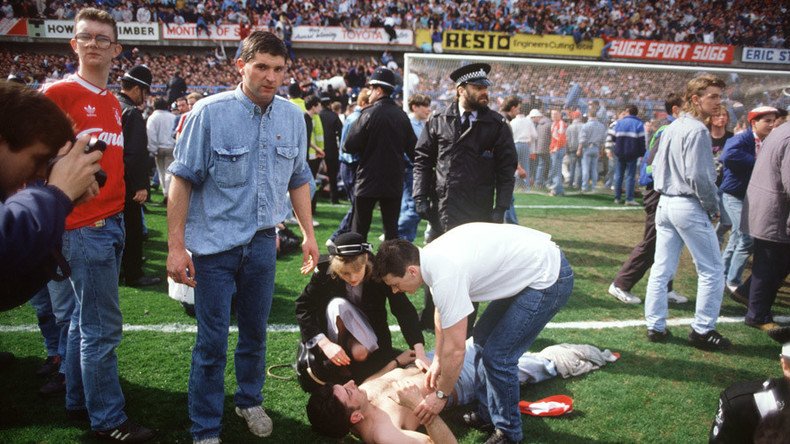Freemasonry has been linked to allegations of a police cover-up concerning the Hillsborough disaster, as a decades-long battle for justice for the families of 96 people who died that fateful day rolls on.
Freemasons’ power and influence in Britain and allegations that Scotland Yard ran a “black propaganda unit” are being probed by two separate criminal inquiries due to come to a close by the end of 2016.
Files relating to a number of key individuals and organizations are currently being scoured for evidence of criminality, including manslaughter and the perversion of the course of justice.
Jon Stoddart, who headed Scotland Yard’s Operation Resolve probe into the planning of the FA Cup semi-final match that left 96 Liverpool FC supporters dead, says scrutiny is being directed at senior ranking officials.
On Tuesday an inquest ruled that all 96 Liverpool fans who died at the football game had been unlawfully killed. Stoddart says the decision will not affect Operation Resolve or the judgement of the Crown Prosecution Service (CPS).
The first investigation, spearheaded by UK watchdog the Independent Police Complaints Commission (IPCC), casts a dim hue over the inner-workings of Britain’s criminal justice system.
It focuses on allegations of a police cover-up concocted to lay the blame for the disaster solely at the feet of innocent Liverpool supporters who had made their way to the Hillsborough stadium to watch the match. Alleged offenses include perjury, conspiracy to pervert the course of justice and misconduct in public office.
Deputy chairwoman of the police watchdog, Rachel Cerfontyne, says the claims concerning a cover-up cut to the heart of public trust in policing.
“We are looking to see if there were controlling minds and if there were, who were those controlling minds,” she told the Times.
The influence Freemasonry and other clandestine groups have among UK police offices is key to this inquiry, according to Cerfontyne.
“The key theme for us was the aftermath, was there a cover-up? What sort of cover-up and who was involved,” she said.
“One of the lines of inquiry was whether Masons or any other group was impacting on people’s relationships and decisions.”
Freemasonry consists of a complex network of fraternal organizations, the origins of which date back to the 14th century when guilds of stonemasons were first regulated.
The vast majority of masonic rituals relate to degree ceremonies. To this day, the age-old tradition has retained three medieval craft guilds: Apprentice, Journeyman/Fellowcraft and Master Mason. Members of these groups are known as Freemasons or Masons.
Candidates looking to become Freemasons are expected to swear on a sacred religious text of their choice during a formal initiation process.
Lodges are central to the practice, and are generally supervised on a regional level by what’s known as a Grand Lodge. These are reportedly independent in nature, and often reject one another’s legitimacy.
The so-called United Grand Lodge of England has reportedly submitted records of who attended lodge meetings in the wake of the Hillsborough disaster.
The IPCC probe is scrutinizing amendments to police statements, as well as allegations that misinformation was fed to UK media outlets, MPs, and subsequent inquiries, in a concerted effort to direct accountability for the deaths of Liverpool fans away from police.
Norman Bettison, 60, a former chief inspector with South Yorkshire Police who worked alongside a team gathering evidence concerning the Hillsborough disaster, denies being part of a so-called “black propaganda unit.” He was later made chief constable of Merseyside and West Yorkshire Police.
The IPCC is also probing the actions of police chiefs in the wake of the Hillsborough disaster, particularly concerning the monitoring of blood/alcohol levels, sourcing of the criminal records of the deceased, and secret surveillance operations on victims’ families.
The second investigation, referenced by Stoddart, is a Scotland Yard probe enacted in the wake of a damning report published by Britain’s Hillsborough Independent Panel in 2012. The panel concluded that 164 police documents had been sanitized, and in 116 of these cases the changes related to remarks deemed to be “unfavorable” regarding the policing of the football match.
Offenses now being considered by UK authorities in light of this probe include misconduct in public office, skewing the course of justice and gross negligence manslaughter.
Lines of inquiry span the Hillsborough stadium’s safety, planning and preparation for the fateful football match, the way in which emergency services responded to the crisis that ensued, and instructions given to Liverpool fans who tragically perished in the crush that occurred just minutes after kick-off.
The Football Association and UK football club Sheffield Wednesday, which jointly own the Hillsborough stadium, are also being investigated for alleged offenses under the UK’s Health and Safety at Work and Sports Ground Acts.
Should criminal charges be brought against David Duckenfield, the chief officer on duty at the disaster-stricken match, the CPS will be compelled to reverse its decision to halt criminal proceedings relating to manslaughter that date back to the turn of the millennium.

